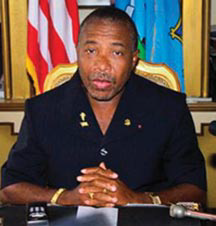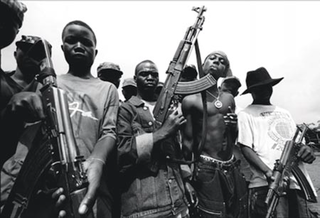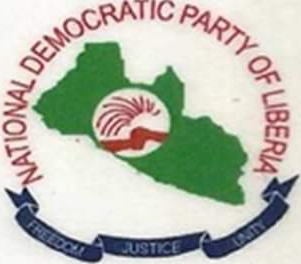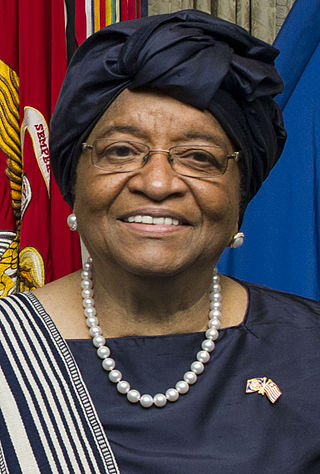Related Research Articles

Liberia is a country in West Africa founded by free people of color from the United States. The emigration of African Americans, both freeborn and recently emancipated, was funded and organized by the American Colonization Society (ACS). The mortality rate of these settlers was the highest among settlements reported with modern recordkeeping. Of the 4,571 emigrants who arrived in Liberia between 1820 and 1843, only 1,819 survived (39.8%).

The Politics of Liberia takes place in a framework of a presidential representative democratic republic modeled on the government of the United States, whereby the President is the head of state and head of government; unlike the United States, however, Liberia is a unitary state as opposed to a federation and has a pluriform multi-party system rather than the two-party system that characterizes US politics. Executive power is exercised by the government. Legislative power is vested in both the government and the two chambers of the legislature.

Charles McArthur Ghankay Taylor is a Liberian former politician and convicted war criminal who served as the 22nd president of Liberia from 2 August 1997 until his resignation on 11 August 2003 as a result of the Second Liberian Civil War and growing international pressure.

Samuel Kanyon Doe was a Liberian politician who served as the 21st President of Liberia from 1986 to 1990. He ruled Liberia as Chairman of the People's Redemption Council (PRC) from 1980 to 1986 and then as president from 1986 to 1990.
Prince Yormie Johnson is a Liberian politician who has served as a senator for Nimba County since 2006. A former rebel leader, Johnson played a prominent role in the First Liberian Civil War.

The First Liberian Civil War was the first of two civil wars within the West African nation of Liberia. It lasted from 1989 to 1997. President Samuel Doe established a regime in 1980 but totalitarianism and corruption led to unpopularity and the withdrawal of the support of the United States by the late 1980s. The National Patriotic Front of Liberia (NPFL) led by Charles Taylor invaded Liberia from the Ivory Coast to overthrow Doe in December 1989 and gained control over most of the country within a year. Doe was captured and executed by the Independent National Patriotic Front of Liberia (INPFL), a splinter faction of the NPFL led by Prince Johnson, in September 1990. The NPFL and INPFL fought each other for control of the capital city, Monrovia and against the Armed Forces of Liberia and pro-Doe United Liberation Movement of Liberia for Democracy. Peace negotiations and foreign involvement led to a ceasefire in 1995 but fighting continued until a peace agreement between the main factions occurred in August 1996. Taylor was elected President of Liberia following the 1997 Liberian general election and entered office in August of the same year.

The United People's Party (UPP) is a political party in Liberia. It formed in the 1980s as a successor to the Progressive Alliance of Liberia (PAL) and the Progressive People's Party (PPP), but was initially banned under President Samuel Doe because of its "socialist leanings".
Ruth Sando Fahnbulleh Perry was a Liberian politician. She served as the interim Chairman of the Council of State of Liberia from 3 September 1996 until 2 August 1997, following the First Liberian Civil War. After eleven international peace attempts between 1990 and 1995 to end the civil war in Liberia, the attempts appeared to succeed. The interim Council of State consisted of a civilian chairman, as well as members of warring factions: Charles Taylor, United Liberation Movement of Liberia for Democracy-K leader Alhaji Kromah, Liberia Peace Council leader George Boley, and two other civilians.

The Second Liberian Civil War was a civil war in the West African nation of Liberia that lasted from 1999 to 2003.

General elections were held in Liberia on 19 July 1997 as part of the 1996 peace agreement ending the First Liberian Civil War. The presidency, as well as all seats in the House of Representatives and the Senate were up for election. Voter turnout was around 89%. Former rebel leader Charles Taylor and his National Patriotic Party (NPP) won the election with 75.3% of the vote, giving it about three-quarters of the legislative seats according to the proportional representation system. Taylor was inaugurated as president on 2 August 1997.
The National Patriotic Front of Liberia (NPFL) was a Liberian rebel group that initiated and participated in the First Liberian Civil War from 24 December 1989 – 2 August 1997. The NPFL emerged out of rising ethnic tensions and civil unrest due to the Liberian government that was characterized by totalitarianism, corruption, and favoritism towards ethnic Krahns. The NPFL invaded Liberia through Ivory Coast’s border with Nimba County in Liberia under the direction of Charles Taylor, a former Liberian politician and guerrilla leader who served as the 22nd president of Liberia from 2 August 1997 until his resignation on 11 August 2003.
The Liberia Peace Council (LPC) was a rebel group that participated in the Liberian Civil War under the leadership of George Boley.
AlhajiGarxim Varmuyan Kromah was a Liberian journalist who became a warlord and leader of the ULIMO faction during the Liberian Civil War. He was a Muslim and member of the Mandingo ethnic group from Tusu Town, Quardu Gboni District, Lofa County. He attended St. Patrick's High School (1973).

General elections were held in Liberia on 15 October 1985. They were the first elections since the 12 April 1980 military coup that brought Samuel Doe to power. During 1984, a new draft constitutional was approved in a referendum, which provided for a 58-member civilian and military Interim National Assembly, headed by Samuel Doe as president. After a ban on political parties was lifted, four parties – Doe's National Democratic Party (NDP), the Liberian Action Party, the Unity Party and the Liberia Unification Party – contested the elections.

The National Democratic Party of Liberia (NDPL) is a political party in Liberia.

Ellen Johnson Sirleaf is a Liberian politician who served as the 24th president of Liberia from 2006 to 2018. Sirleaf was the first elected female head of state in Africa.
Joshua Milton Blahyi, better known by his nom de guerre General Butt Naked, is a Liberian evangelical preacher, writer and former warlord best known for his actions during the First Liberian Civil War. During the conflict, Blahyi led a group of soldiers which fought on the side of anti-rebel group United Liberation Movement of Liberia for Democracy (ULIMO) before converting to Christianity and becoming a pastor in 1996.

Jucontee Thomas Woewiyu, also known as Tom Woewiyu or Thomas Smith, was the former leader of the National Patriotic Front of Liberia (NPFL), with Charles Taylor.
Events in the year 2020 in Liberia.

The Liberia national transitional government was a provisional government, or rather the name given to three successive governments, in Liberia formed in the midst of the First Liberian Civil War. The LNTG was product of the July 25, 1993, Cotonou Peace Accord, whereby the Interim Government of National Unity disbanded. The respective LNTG-I, LNTG-II and LNTG-III governments were differentiated by being led by three different chairpersons. Initially supposed to last for six months to allow for disarmament of warring factions and preparations of national elections, the LNTG timeline lasted until mid-1997. Various of the warring factions had direct participation in the LNTG and civilian elements were gradually sidelined. Through participation in the provisional governance of LNTG the different warlords could gain access to state resources, even in situations when armed hostilities continued. The LNTG period ended with the 1997 Liberian general election whereby Charles Taylor was elected President of Liberia.
References
- ↑ "George Boley, Liberian Warlord, Is Finally Under Arrest". The Atlantic. 27 January 2010.
- ↑ "Human Rights Abuses by the Liberian Peace Council and the Need for International Oversight (Human Rights Watch Report, May 17, 1994)". www.hrw.org. Retrieved 13 October 2023.
- ↑ "Truth and Reconciliation Commission of Liberia". www.trcofliberia.org. Retrieved 13 October 2023.
- ↑ pages/Gary-Craig/818017588256577?ref=aymt_homepage_panel. "Feds say former Clarkson man lied to help Liberian warlord". Rochester Democrat and Chronicle. Retrieved 10 April 2019.
{{cite web}}: CS1 maint: numeric names: authors list (link) - ↑ "Liberia ex-warlord George Boley to be deported from US". BBC. 7 February 2012.
- ↑ "Elections in Liberia". africanelections.tripod.com. Retrieved 13 October 2023.
- ↑ "Report: Ellen in Diplomatic Talks over Boley's Detention". December 2010.
- ↑ "Liberian human rights violator removed from US".
- ↑ "Liberia: Representative George Boley Sues Fellow Lawmaker Dixon Sebo for Damages for Wrong".